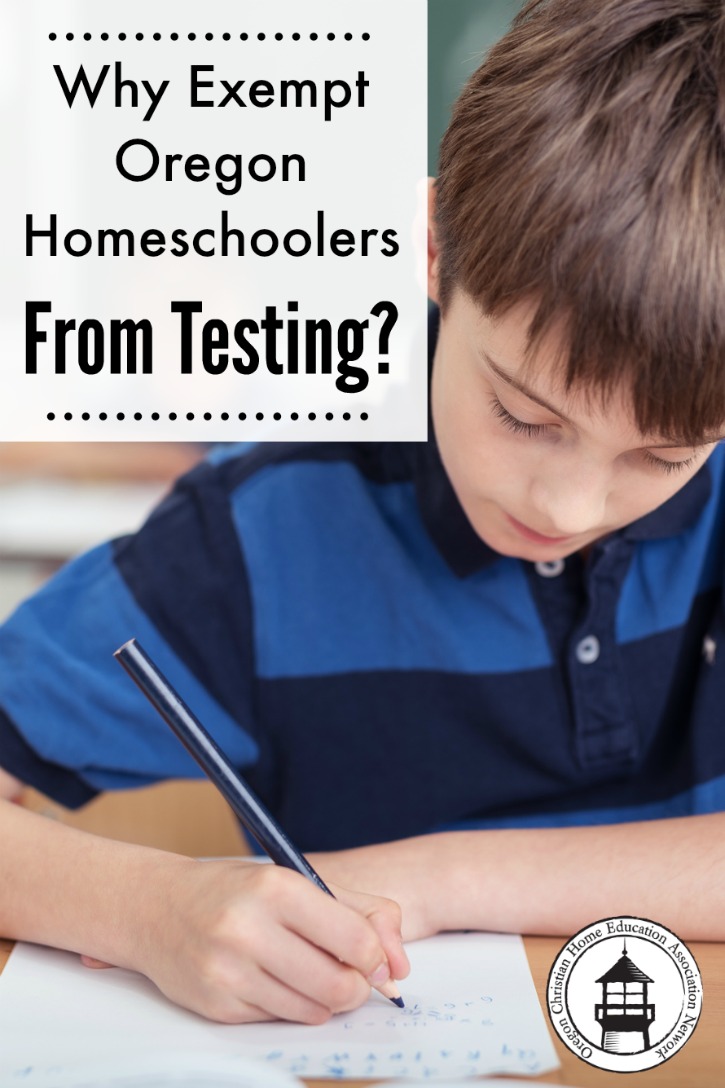OCEANetwork submits bills to the Oregon legislature to eliminate testing requirements for homeschoolers (we plan to submit one in 2025 during the Oregon legislative session).
Why do we care? What is wrong with testing? Absolutely nothing. Testing is a tool for measuring academic progress. It can identify a child’s strengths and weaknesses. It can help us to improve teaching strategies and/or modify curriculum choices.
However, Oregon’s homeschool law which uses testing as a tool to determine who can and cannot homeschool is unbiblical, ineffective, and unfair.

Summary of Oregon’s current homeschool testing law:
- All homeschool students in grades 3, 5, 8, and 10 are required to take achievement tests.
- Parents must submit test scores to their local ESD if requested.
- Students scoring below the 15th percentile and declining for 2 consecutive years may be remanded to an institutional school by the ESD Superintendent.
(See ORS 339.035)
Why Exempt Oregon Homeschoolers from Testing?
Unbiblical
The decision for when and how to raise our children, including choices about their education, belongs to us as parents. God gives us this mandate in His Word.
- Bring [your children] up in the nurture and admonition of the Lord. (Eph. 6:4).
- Know ye not that to whom ye yield yourselves servants to obey his servants ye are to whom ye obey? (Rom. 6:16).
- Then Peter and the other apostles answered and said, We ought to obey God rather than men. (Acts 5:29 2).
Ineffective
Testing has no correlation with academic achievement. Homeschooled children excel because they are homeschooled, not because they are tested.
- Purpose of Oregon’s testing law: To make test scores available to local ESDs.
- Actual percentage of scores requested by ESDs: 11-15%
- Why only 11-15%?
- ESDs have learned that homeschool students score an average of two grades above their age level.
- ESDs receive no funding for homeschoolers, and they have no funds to spare.
- Therefore, 85-90% of homeschoolers test for no bureaucratic reason under the current law.
Unfair
Children on the lowest end of the scale are the ones who benefit most from homeschooling. Unfortunately, they are the most at risk under Oregon’s current law. The struggling learners benefit most from homeschooling’s one-on-one attention and parental involvement. Statistics show that homeschooling is the most effective method for students in every academic range. Unfortunately, students who score in the lowest 15% can be sent back to public school if their scores don’t improve within two years.
The majority of homeschooled children perform an average of two years above grade level. These high-achievers, however, are required to take tests based on their grade level by age, not their academic level. This is not an efficient use of parents’ time and money.
Conclusions
- If parents wish to test their children, there is nothing prohibiting us from doing so.
- Parents should spend their time, money, and resources to test their children in the manner of their choosing, not according to a one-size-fits all schedule or method.
- Parents are accountable to God for the education and upbringing of their children.
- 85-89% of Oregon’s homeschooling families are spending time and money they don’t have to administer tests that their children don’t need just to fulfill the law.
- Children on the lowest end of the academic scale pay the ultimate price: They can be sent back to public school and denied the one academic choice that ensures them the highest opportunity for success.
More Information
- Five Unfounded Assumptions Embodied in Homeschool Regulation from Homeschooling Backgrounder
- Research Facts on Homeschooling (Updated Regularly) from the National Home Education Research Institute (NHERI)
- A Systematic Review of the Empirical Research on Selected Aspects of Homeschooling as a School Choice from NHERI
You Might Also Like…

I’m confused. Do I need to test my 10th grade student I’m withdrawing or not. He is failing already. I want to do our own curriculum baised on his interests.
Current homeschool law in Oregon requires testing be done at grades 3, 5, 8, and 10. You can find out more about existing homeschool law and the requirements for Oregon homeschoolers here >> https://oceanetwork.org/summary-homeschool-law/
OCEANetwork works to remove those testing requirements, but for now they are still required by law.
I believe that a student must be homeschooled for 18 months before testing is required. For example, if I withdraw a third grader at the beginning of the school year, testing is not required until the end of the fifth grade. That was my understanding of how the testing schedule works.
Janna,
Thanks for bringing that up. You are correct. If you start homeschooling in the middle of their education, you homeschool 18 months, then have your child tested at the next target grade level. You can read all the details about the homeschool laws at https://oceanetwork.org/summary-homeschool-law/.
There is a form for opting out of testing. Does anyone know if that is only for public school kids and not for homeschoolers?
Currently, homeschool laws in Oregon do not allow homeschoolers to opt out of testing. It is required at the end of grades 3, 5, 8, and 10 (annually for those participating in interscholastic sports) with a PDP option for special needs students.
Question: Since Oregon High School graduates are not currently being held to standards for Language Arts, and Mathematics to graduate for the next 5 years. Do Homeschoolers still need to follow through on Standard testing, and if so, WHY?
The current homeschool law still states that Oregon homeschoolers must complete testing at the end of grades 3, 5, 8, and 10. Unless/until that is directly changed, homeschoolers will continue to be required to do so, regardless of what standards public schoolers are held to. BTW – OCEANetwork believes testing should not be required of homeschoolers. (https://oceanetwork.org/exempt-oregon-homeschoolers-testing/) In fact, we’re submitting a Homeschool Freedom Bill in the 2025 legislative session that would remove that requirement, among others.